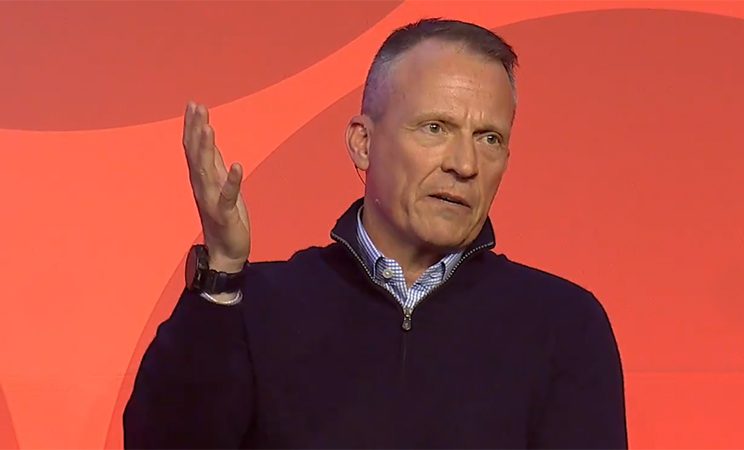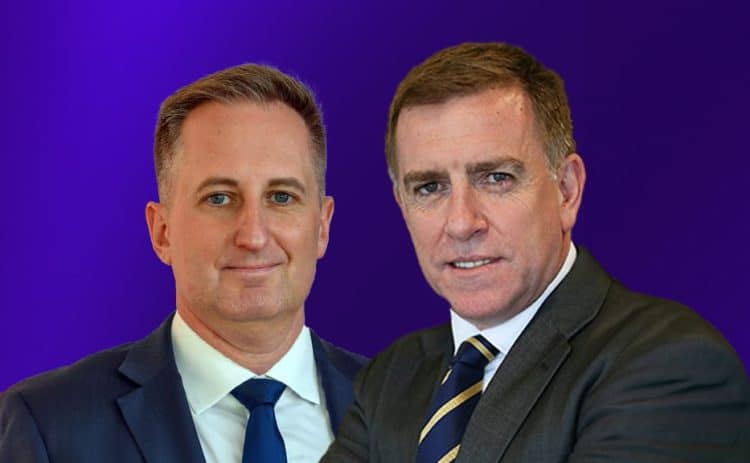Mainstream Online Web Portal
LoginInvestors can view their accounts online via a secure web portal. After registering, you can access your account balances, periodical statements, tax statements, transaction histories and distribution statements / details.
Advisers will also have access to view their clients’ accounts online via the secure web portal.
The Point
Quick, actionable insights for investors
The headlines driving Aussie equities | Falling USD should lift EMs | Where to find opportunities in theme-driven markets
Loading posts...

Elise McKay: The headlines driving Aussie equities this week
Quick view
Elise McKay: The headlines driving Aussie equities this week
Here are the main factors driving the ASX this week, according to Aussie equities analyst and portfolio manager ELISE MCKAY and reported by head investment specialist CHRIS ADAMS
Read Pendal’s latest weekly equities overview.

Crispin Murray: Where to find ASX opportunities amid ‘theme-driven’ market noise
Quick view
Crispin Murray: Where to find ASX opportunities amid ‘theme-driven’ market noise
Share prices are increasingly moved by popular themes like AI disruption, trade wars, and tariff fears – without regard to company fundamentals or long-term valuations.
As a result, quality Australian companies with sound outlooks and predictable cash flows are being indiscriminately sold off.
That’s creating opportunities for active fund managers, Pendal’s head of equities Crispin Murray told Morningstar’s 2025 investment conference in Sydney last week.
“We believe this is creating more distortions in the market. It means the amplitude of mispricing is greater, and it lasts longer.”
Global market dislocation means the ASX has a range of industrial companies with predictable cash flows and returns that have been sold down and offer opportunities for investors, he says.
“One example is CSL – one of Australia’s largest, most successful companies. Five years ago it was running high – at an over-40 multiple. It’s now down to about 22 times earnings,” he says.
Fears of the impact of tariffs on CSL are misplaced, assuming the company doesn’t do anything to respond – “and I think that’s where the market’s overreacting,” argues Crispin.
“We think the risk on the tariff front is being overstated, and that’s what’s providing you the opportunity.” Pendal owns CSL.
Read more

‘Emerging markets crisis’? That’s a wildly overstated view, say our experts
Quick view
‘Emerging markets crisis’? That’s a wildly overstated view, say our experts
Some analysts have described a pattern of a weaker dollar and rising bond yields in the US as a ‘classic emerging markets crisis’.
“As veterans of actual emerging crises dating back to 1994, we consider that view to be wildly overstated,” writes Pendal’s EM team in their latest analysis.
In spite of volatility and weakness in core US financial markets, the currencies of almost all emerging markets strengthened against the US dollar in March and April. Meanwhile bond yields fell for the majority of major EMs.
“Emerging markets are driven by two major global drivers: international capital flows and international trade.
“A weaker dollar represents capital flowing out of the US and into the rest of the world – and a weaker dollar has consistently been positive for emerging markets over the past 30 years.
“Although evolving tariff policies threaten a downturn in global trade, the message from financial markets is that investor uncertainty about US economic policies is a clear positive for emerging economies and for investors in emerging markets.”
Read more

Amy Xie Patrick: China, the US, and the value of uncertainty
Quick view
Amy Xie Patrick: China, the US, and the value of uncertainty
This month’s divergence in US and China rates policies wasn’t just a curiosity for money managers, observes Pendal’s head of income strategies, Amy Xie Patrick.
“It’s a study in contrasts, a reflection of deeper structural differences, and a reminder that policy effectiveness doesn’t always come wrapped in transparency or even democracy,” says Amy in her latest markets analysis.
On May 7, the US Fed left rates unchanged despite growing political pressure. Meanwhile, the People’s Bank of China delivered another dose of stimulus.
“One central bank faced market criticism over its non-committal guidance,” notes Amy. “The other moved swiftly and silently, without needing to justify its decision.
“Perhaps the most contrarian yet valuable takeaway is that less policy guidance may be a good thing.
“By avoiding the hard task of forecasting far into the future, we free ourselves from unhelpful narratives may that turn out to be false.
“By focusing on getting it right rather than always being right, we’re able to preserve the flexibility to change course when the fundamentals change.”
Read Amy’s full article here
Latest updates from our fund managers


Tim Hext: Australia to expect state budget downgrades
June 25, 2025
See all
Emerging markets: Look past commodity exports to countries with strong domestic demand
July 26, 2023
See allSubscribe to The Point
Get regular insights on investing, market analysis and portfolio management from the experts at Perpetual Group.
These podcasts are for general information purposes only, should not be considered as a comprehensive statement on any matter and should not be relied upon as such. They have been prepared without taking into account any recipient’s personal objectives, financial situation or needs. Because of this, recipients should, before acting on the information, consider its appropriateness having regard to their or their clients’ individual objectives, financial situation and needs. The information is not to be regarded as a securities recommendation.
The information in these podcasts may contain material provided by third parties, is given in good faith and has been derived from sources believed to be accurate as at its issue date. While such material is published with necessary permission, and while all reasonable care has been taken to ensure that the information in this presentation is complete and correct, to the maximum extent permitted by law neither Pendal nor any company in the Pendal group accepts any responsibility or liability for the accuracy or completeness of this information.
Any projections contained in these podcasts are predictive and should not be relied upon when making an investment decision or recommendation. Whilst we have used every effort to ensure that the assumptions on which the projections are based are reasonable, the projections may be based on incorrect assumptions or may not take into account known or unknown risks and uncertainties. The actual results may differ materially from these projections.
Performance figures are calculated in accordance with the Financial Services Council (FSC) standards. Performance data (post-fee) assumes reinvestment of distributions and is calculated using exit prices, net of management costs. Performance data (pre-fee) is calculated by adding back management costs to the post-fee performance. Past performance is not a reliable indicator of future performance.
For more information, please call Customer Relations on 1300 346 821 8.00am to 6:00pm (Sydney time) or visit our website www.pendalgroup.com

Crispin Murray: What’s driving the market this week?
With barely three weeks to go, Donald Trump has gained momentum in average betting odds, moving to a 56% chance of a win versus 43% for Kamala Harris.
It’s his biggest lead since Harris entered the race. How are investors reacting?
“Market volatility has picked up, but the forward curve has this falling back post-election,” note Pendal’s head of equities Crispin Murray.
“To date, this has not impacted equities and is supported by credit spreads staying low.
“The most likely election outcome is a Democrat or Republican presidential win without sweeping both the House and Congress – and hence being constrained in what they can achieve.
“The main difference in market impact relates to bonds, with Trump’s threat of higher tariffs and less immigration potentially leading to higher inflation in late 2025, and therefore to higher yields.
“This may have limited impact on equities as it could be seen to come with higher growth.”
Crispin explains more in his latest weekly note

Elise McKay: What’s driving equities this week?
Quick view
Elise McKay: What’s driving equities this week?
Here are the main factors driving the ASX this week, according to Aussie equities analyst and portfolio manager ELISE MCKAY and reported by investment specialist JONATHAN CHOONG.
Read Pendal’s latest weekly equities overview.

Income & Fixed Interest: Pendal’s quarterly insights on the themes driving Aussie markets
Quick view
Income & Fixed Interest: Pendal’s quarterly insights on the themes driving Aussie markets
In their latest quarterly report, the team discusses some of the biggest trends affecting Australian fixed income investors right now – click through.

Tim Hext: Inflation is easing, but the RBA isn’t celebrating yet
Quick view
Tim Hext: Inflation is easing, but the RBA isn’t celebrating yet
The latest GDP data shows a weak Australian economy, but the numbers should pick up from here, says Pendal’s head of government bonds, Tim Hext. Here are five takeaways.
1. Government spending remains strong despite government investment tapering off. “This remains a central factor behind strong employment and inflation – and the animated debate between Treasurer Chalmers and RBA Governor Bullock,” says Tim.
2. Households are going backwards again. “Tax cuts and subsidies could bring the consumer back in Q3, but early data from July suggests it may be a slow burn.”
3. Households are barely saving anything. This likely indicates incomes not keeping up with prices rather than exuberant consumer spending, says Tim.
4. Australia’s commodity boom is waning (a negative for GDP) but remains historically strong
5. GDP should pick up from here. The RBA is forecasting 1.7% GDP this year and 2.6% in 2024-25. Since the first two quarters are up 0.4%, the RBA is expecting 0.6% to 0.7% quarterly rises over the next year.
“That may seem a bit optimistic, but the possibility of rate cuts and falling inflation could well see a decent rebound in the economy.”
Read Pendal’s latest fixed-income report
What US rate cuts mean for investors | Lessons from ASX reporting season | Where to find opportunities in Asia

Tim Hext: What the US rate cut means for investors – and what’s next
Now that the US rate-cutting cycle has begun, the Federal Reserve has shifted its focus from inflation to employment, according to Tim Hext – Pendal’s head of government bond strategies.
The Fed’s 50 basis point cut, its first since 2020, brings rates down to 5%.
Instead of supporting markets, the cut pushed both bonds and equities in the opposite direction – with yields rising by about 5 basis points and equity markets falling around 0.5%.
This reaction, Tim explains, is more about market expectations versus the Fed’s own projections.
“The impact of hosing down expectations outweighed the larger actual cut,” he says.
The Fed’s rate projections show that the market is still ahead of the Fed, particularly in the near term.
With two meetings between now and the end of the year, Tim adds that employment data will be key to the Fed’s decision-making.
“The Fed is now more focused on employment than inflation, so payroll data will be front and centre,” he says.
He explains more in his latest article
Loading posts...
Subscribe to The Point
Get regular insights on investing, market analysis and portfolio management from the experts at Perpetual Group.










